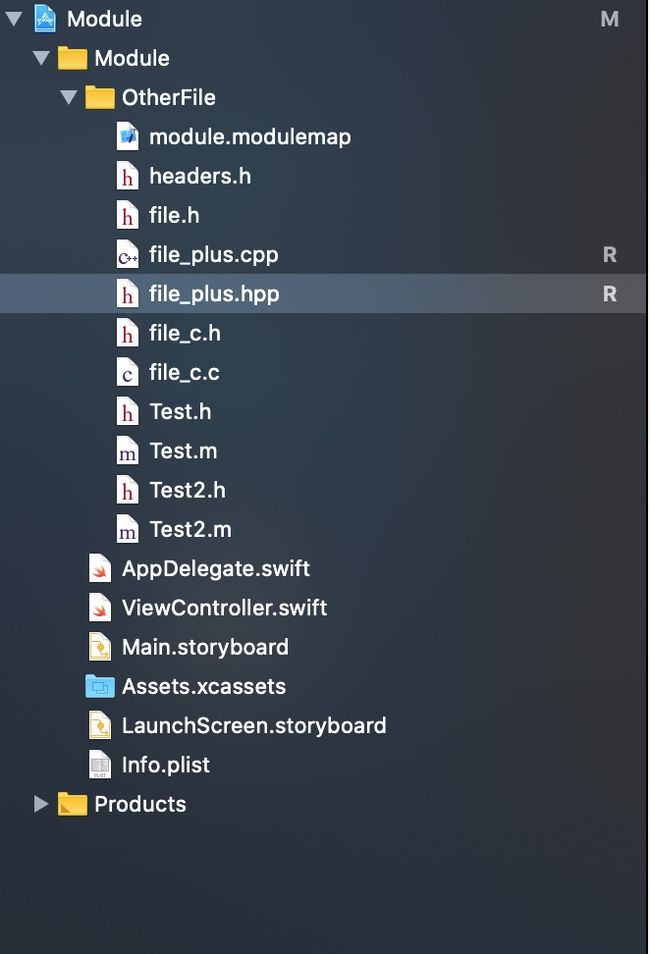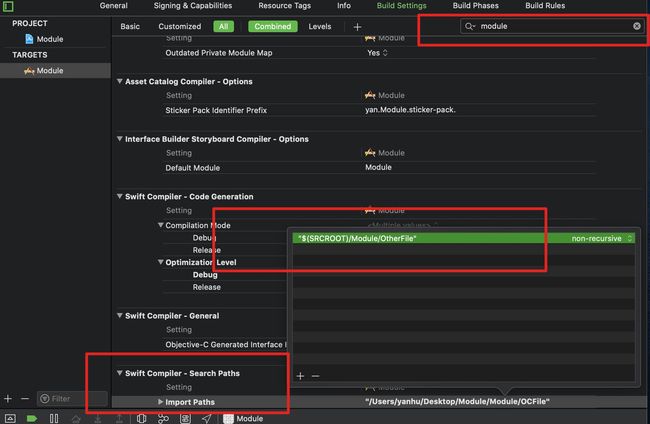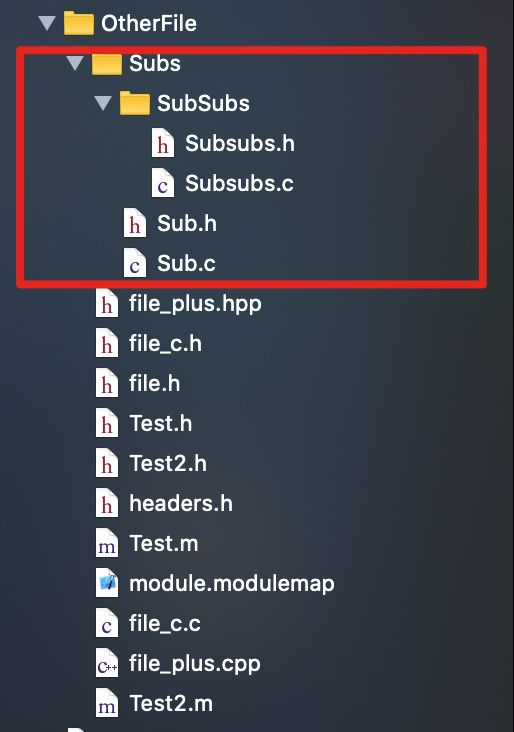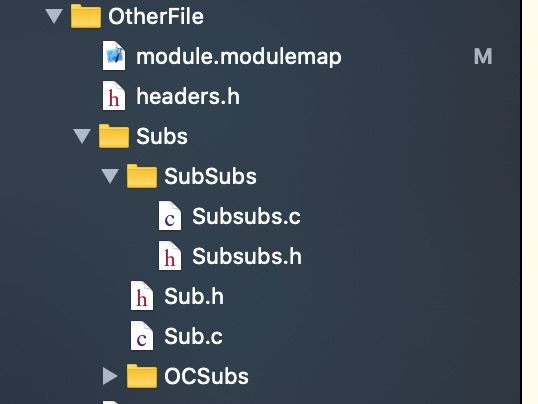最近有个小伙伴问了一个问题, 为什么在 swift framework 中使用了自定义module.modulemap, build 出来的 framework 会报 Missing required module
Modules 的介绍
Module maps are specified as separate files (each named module.modulemap) alongside the headers they describe, which allows them to be added to existing software libraries without having to change the library headers themselves
在 framework 中不要使用自定义 module, 自定义module 并不会编译到二进制文件中, 但会通过 import paths 去找, 但当你的路径发生改变的时候, 就找不到了, 虽然你在 framework 的工程中引入的是相对路径, 但当你编译 framework 的时候, 只有绝对路径了, 所以当你把做好的 framework 丢给别人, 别人会报 Missing required module.
Swift 中最简单最优雅的引用 oc 和 c 方式。
首先建一个 group, 就是你要 import 的,如图文件名叫 OtherFile,所以在哪里要使用这个module的文件,就直接 import OtherFile。
// like this
import UIKit
import OtherFile
class ViewController: UIViewController {
override func viewDidLoad() {
...
}
}
module.modulemap 文件
// module.modulemap 文件
module OtherFile {
// headers.h 和 module.modulemap 必须在同一group下,否则需要配置 `header "/??/headers.h"`
header "headers.h"
export *
}
headers.h文件
// headers.h文件
// 在 headers.h 中引用需要暴露的文件
// for c++
#include "file.h"
// for c
#include "file_c.h"
//#ifdef __OBJC__
// for oc
#import "Test.h"
#import "Test2.h"
//#endif
注意, 同时存在 oc 和 c 文件 需要分开处理, 需要把 oc 文件单独加上 requires objc, 所以建议使用 umbrella, 并且把 c 和 oc 分开多个 module.
requires 列表
module OtherFile {
// c file
header "file.h"
header "filea.h"
header "filebbb.h"
export *
umbrella "Subs"
module * { export * }
// oc file
module Test {
requires objc
header "Test3.h"
header "Test2.h"
header "Test.h"
export *
export *
umbrella "Subs/OCSubs" // 单独把 Subs 中的 oc 文件, 单独列出来, 否则会编译失败
module * { export * }
}
}
The std module can be extended to also include C++ and C++11 headers using a requires-declaration:
module std {
// C standard library...
module vector {
requires cplusplus
header "vector"
}
module type_traits {
requires cplusplus11
header "type_traits"
}
}
同时需要配置如图
import paths 通过语义就是 可以
import 的,即
import OtherFile。
可以直接拖拽
group 直接到目录下, 需要配置
$SRCROOT/, 绝对路径。
之后就可以在这个文件夹下放你随便的
c,
oc 文件,舒服的使用。
umbrella.h文件
什么是umbrella header?
umbrella + 目录, 可以递归导出子目录下的所有.h
module OtherFile {
header "headers.h"
export *
// 倒入 Subs 文件夹下所有的.h
umbrella "Subs"
module * { export * }
}
代码实例
三个方法分别对应不同目录下的文件
run()
subRun()
subSubRun()
// 打印
// run
// sub run
// sub sub run
所以, 我们可以通过 umbrella 更简单的实现导出, 只需要把文件都放到子目录下, 并导出就可以了, 同时支持 c 和 oc.
module * { export * } 和 export * 的区别
如下两个 modules 分别用 module * { export * } 和 export * 来实现的
module OtherFile {
// c file
module CFile {
header "file.h"
header "filea.h"
header "filebbb.h"
export *
}
umbrella "Subs"
module * { export * }
// oc file
module Test {
requires objc
header "Test3.h"
header "Test2.h"
header "Test.h"
export *
umbrella "Subs/OCSubs"
module * { export * }
}
}
上面 OtherFile module 编译产生:
import OtherFile.CFile
import OtherFile.Sub
import OtherFile.SubSubs
import OtherFile.Test
上面的 module 使用 module * { export * } 产生了四个子 module
module OtherFile {
// c file
module CFile {
header "file.h"
header "filea.h"
header "filebbb.h"
export *
}
// subs 文件夹
umbrella "Subs"
export *
// oc file
module Test {
requires objc
header "Test3.h"
header "Test2.h"
header "Test.h"
export *
umbrella "Subs/OCSubs"
module * { export * }
}
}
上面 OtherFile module 编译产生:
import OtherFile.CFile
import OtherFile.Test
//
// Subsubs.h
// ModuleTest
//
// Created by Yan Hu on 2019/10/14.
// Copyright © 2019 yan. All rights reserved.
//
public func subSubRun()
//
// Sub.h
// ModuleTest
//
// Created by Yan Hu on 2019/10/14.
// Copyright © 2019 yan. All rights reserved.
//
public func subRun()
上面的 module 使用 export * 产生了2个子 module 和两个方法, 这两个方法分别属于 Subsubs.h 和 Sub.h
你会发现, 使用
umbrella "Subs"
module * { export * }
进行导出, 把 subs 文件夹下所有的 .h 文件单独生成了一个 subModule (子 module)
使用
umbrella "Subs"
export *
进行导出, 会直接把所有 .h 中的方法, 直接导入到当前的 module 中, 所以在使用的时候, 可以跟进需求来使用.
参数 system 和 的介绍
// 参数使用
module OtherFile [system] [extern_c] {
}
The system attribute specifies that the module is a system module. When a system module is rebuilt, all of the module’s headers will be considered system headers, which suppresses warnings. This is equivalent to placing #pragma GCC system_header in each of the module’s headers. The form of attributes is described in the section Attributes, below.
The extern_c attribute specifies that the module contains C code that can be used from within C++. When such a module is built for use in C++ code, all of the module’s headers will be treated as if they were contained within an implicit extern "C" block. An import for a module with this attribute can appear within an extern "C" block. No other restrictions are lifted, however: the module currently cannot be imported within an extern "C" block in a namespace.
关于 import 的使用 sub modules
以上面产生四个sub modules 为例, 当我在代码中直接 import OtherFile.Test, 按照正常逻辑是, 只导入了 Test 这个子模块, 所以我可以使用这个子模块的代码, 但不是这样的, 即使你只导入了这个子模块, 其他的子模块的代码依旧可以访问到, 这个可能是 swift 5.0 说的Modules 不稳定的地方?
那么怎么实现只导入部分代码来进行使用?
可以通过 import class OtherFile.Test.Test 来导入 Test 这个类,
同时这里还可以简写为 import class OtherFile.Test, 这样会从模块 OtherFile 和它的子模块中需找到 Test 这个类, 并且导入.
当你使用import class OtherFile.Test.TestSubSub 来导入 TestSubSub 这个类的时候, 发现竟然依然可以导入, TestSubSub类明明在 TestSubSub 模块下, 但OtherFile.Test.TestSubSub依旧可以导入, 这也是 swift 5.0 说的Modules 不稳定的地方?
反正就是可以导入单个 typealias, struct, class, enum, protocol, var, func, 导入的方式只需要替换上面 import class OtherFile.Test.Test 中的 class 就可以了.
使用就是:
import struct SomeModule.WantToImportStruct
import class SomeModule.WantToImportClass
import enum SomeModule.WantToImportEnum
...
源码: 文中源码, 包含 c++ 使用方法
reference: https://clang.llvm.org/docs/Modules.html#includes-as-imports
reference: sub modules 的使用
reference: c++ 使用



